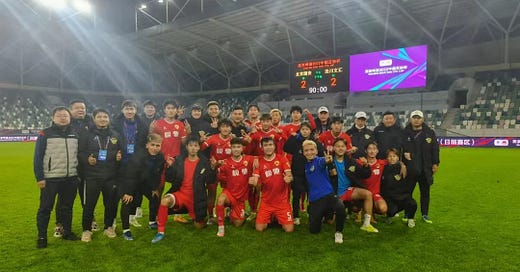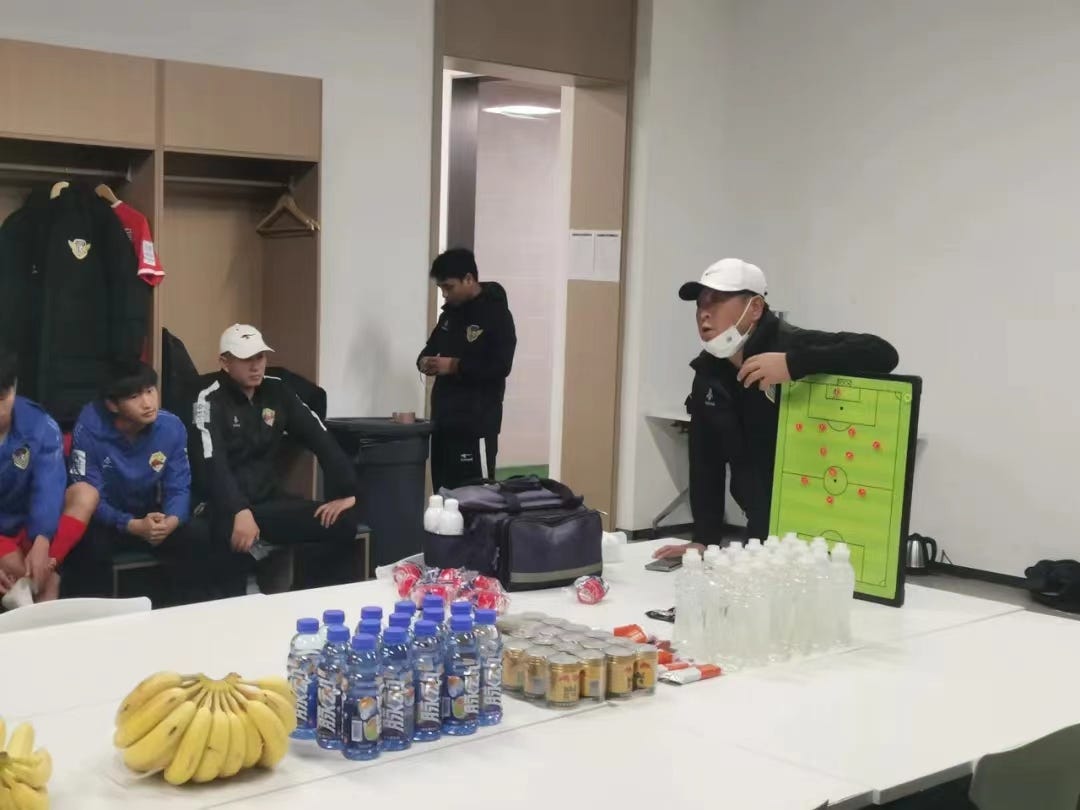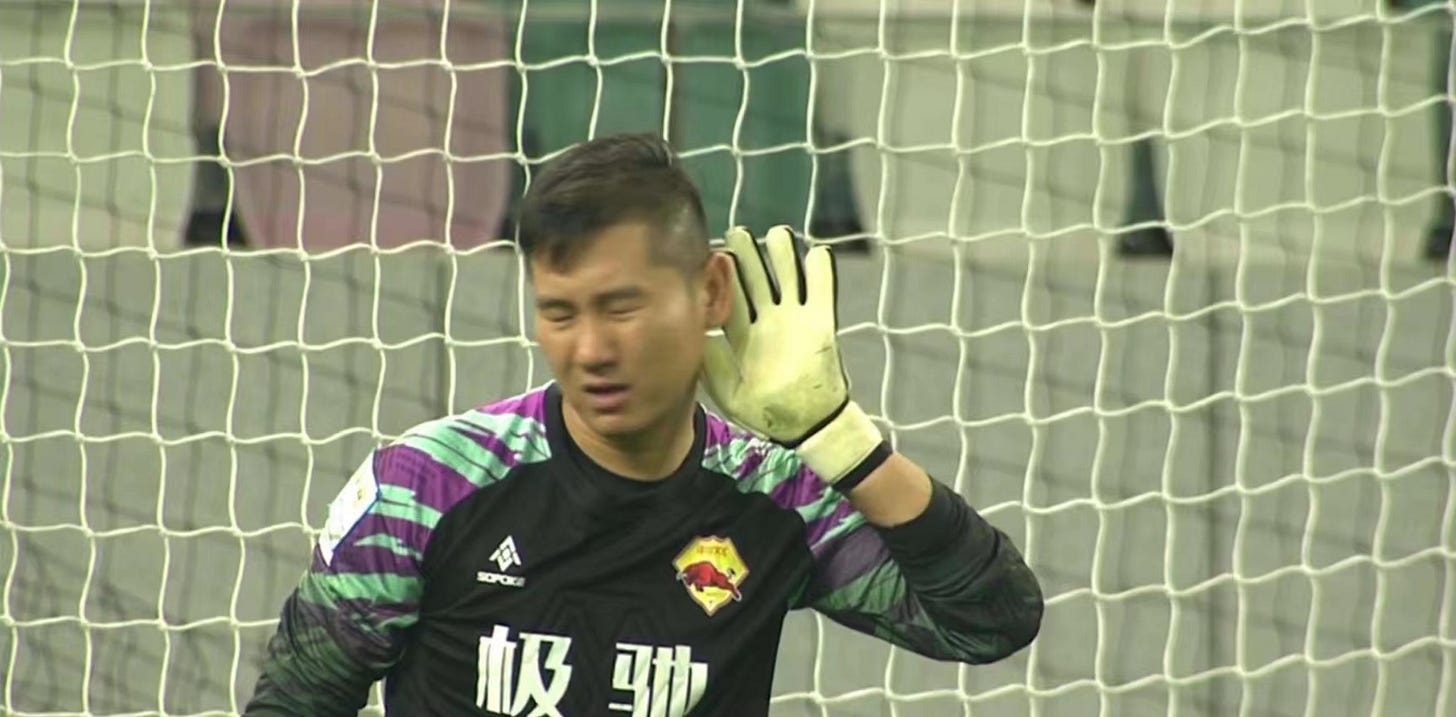Looking back at China's biggest cup shock in recent history
Jingchuan Wenhui players and staff celebrate following their victory.
On Nov. 17 2022, one of the biggest shocks in Chinese football’s recent history took place. Beijing Guoan — a Chinese Super League heavyweight and four-time winner of the Chinese FA Cup — fell in a penalty shootout at the hands of Jingchuan Wenhui, an amateur team bearing the name of a local branch of a chain of stationery shops and hailing from a county in the northwestern Gansu province with a population of just 356,000.
Jingchuan Wenhui then attracted the attention of China’s media, who were eager to put the spotlight on a club that was almost completely unheard of beforehand. Soon, stories were shared about the team’s players working part time as delivery drivers, PE teachers, noodle restaurant owners, and insurance salesmen. But not all of this was true, and to find out exactly how Jingchuan Wenhui were able to mastermind this victory, we first must go back to the winter of 2019.
From near bankruptcy to Beijing Guoan
Former professional footballer Yao Jun was working as a youth football coach in Beihai, Guangxi Zhuang Autonomous Region, completely unaware of how the upcoming COVID-19 pandemic would change everything. With the world closing itself off, Yao was forced to stay in Beihai and make a go of it with Beihai Jichi, a club that had been founded following investment from one of his friends. Back then, the club lurched from one misadventure to the next and was always on the verge of folding. Several players described Yao as being glued to his phone and constantly ringing people to borrow money in the hope of keeping the club afloat.
It wasn’t going much better on the pitch, either, and in 2021 Beihai Jichi failed to join the Chinese Champions League, the amateur league that is the fourth level of China’s footballing pyramid. Faced with the risk of losing his players who were eager to get more playing time, Yao came up with the idea of cooperating with Gansu province, a football wilderness in recent years but with a spot available to join the Chinese Champions League.
Yao spent a considerable amount of time in Gansu travelling between different places and researching where would be the best fit for Beihai Jichi. With the deadline for registering a team fast approaching, Gansu’s footballing authorities made a suggestion: Jingchuan, a county most famous for the apples and pears that are grown there. Yao agreed, thus starting the partnership between Beihai Jichi and Jingchuan Wenhui. This was only the beginning, however, since the agreement between the two clubs stipulated that Beihai Jichi had to cover all financial costs and help develop football in Gansu province. Although asking quite a lot of Beihai Jichi, Yao didn’t seem to mind too much, telling newspaper Southern Weekly in a recent interview: “We could play football again, that was the important thing.”
With things off the ground, a convoluted footballing tour of China began, taking Jingchuan Wenhui from one place to the next, from places such as Nanning and Guigang in the Guangxi Zhuang Autonomous Region to Zunyi in the neighbouring Guizhou province, before finally making their way to Rizhao in northern China’s Shandong province, where their second round Chinese FA Cup tie against Beijing Guoan would be held. Along the way, the team was followed by another bus in which there was a 10 kg washing machine for washing their kit, which is the harsh daily reality for lower league Chinese clubs and a far cry from the luxuries and trappings enjoyed by professional footballers.
Noodle restaurant owners and insurance salesmen
Regardless of the country where it takes place, a cup tie between two sides of disparate resources invariably leads to the focus being put on what mundane jobs the minnow’s players do in their day-to-day lives. The match between Beijing Guoan and Jingchuan Wenhui was no different. Within hours of Jingchuan’s victory, the internet was awash with claims that they had a noodle restaurant owner, insurance salesman, and a butcher among their squad of players. When asked by Southern Weekly if this was true, the players laughed. In fact, they probably can’t fit part-time jobs into their busy schedules.
Yao Jun gives instructions to his players before their match against Beijing Guoan.
One such player who has difficulty balancing his personal life and footballing commitments is 30-year-old striker Liu Yi. He spends most of his time training and lives separately from his wife and child. Urged many times by his family to hang up his boots, Liu hopes that this victory has won them over. “This time, my family might finally stop telling me to retire from football,” he said.
Only 37-year-old goalkeeper Cui Tonghui, who works as a teacher when not playing or training, has a part-time job. The rest of the team is mostly composed of twentysomethings who honed their talents at the youth academies of clubs in the top two tiers but couldn’t make the breakthrough to become first-time regulars. They include 20-year-old Li Jiawei and 22-year-old Guo Hongtao, who played for Jiangsu FC and Shanghai Shenxin respectively. Li was a young prospect at Jiangsu FC when they were at the peak of their powers and has a Chinese Super League winner’s medal to his name. As for Guo Hongtao, he was tipped to be a future star at Shanghai Shenxin but his time at the club was overshadowed by off-the-field disciplinary problems, and both clubs folded in 2020, forcing the pair to look for pastures new. After leaving Jiangsu FC and subsequently playing for lower league teams, Li’s drop in income was so dramatic that his parents had to sell their house in order for him to be able to pay his mortgage.
Both players admit that joining Jingchuan Wenhui was their last roll of the dice. If this didn’t work, it was most likely game over for their footballing career. And Yao Jun, who was so integral in stopping the club going under in 2020, believes that these two players — young talented individuals who did not make the grade earlier in their career but with potential and an eagerness for a second chance — are what clubs like Beihai Jichi should consider to be ideal signings.
“We give players in that age range another opportunity and provide focused training to help them overcome their issues,” Yao told Southern Weekly. “It’s like a football school for them and can give the players a new lease of life.”
What Yao is putting into practice at Jingchuan Wenhui makes the club stand apart from the crowd in the Chinese Champions League, where teams traditionally opt for players who can rely on their experience to get instant results. This proved to be the case for league rivals Yuxi Yukun Steel from the southwestern Yunnan province, as they succeeded in persuading Zibo Cuju players Nan Yuqi and Han Zilong to drop down two divisions and help the club with their promotion push to the third tier. In contrast, it couldn’t be more different at Jingchuan Wenhui, which is the only club in the division to have a youth team.
The upset of a lifetime
This emphasis on youth bore fruit during their Chinese FA Cup tie against Beijing Guoan, with four players aged 21 or under in the starting lineup and the opening goal of the game being scored by 19-year-old Du Zexin from a free kick after just four minutes. Thirty-seven-year-old goalkeeper Cui Tonghui was the outlier in the team due to his age and proved to be the difference between the two sides despite giving away a penalty for a wild challenge on Beijing Guoan midfielder Ruan Qilong in the 54th minute, and he made a string of saves in normal time to keep Jingchuan Wenhui in the game. By the end of the 90 minutes and with the scoreline at 2-2 following an equalizer from Jingchuan Wenhui player Liu Jianxin, it looked doubtful whether Cui would still be of any use in a penalty shootout. He had barely moved for Cao Yongjing’s goal from the penalty spot earlier in the match and was visibly in discomfort, having injured his shoulder during his travails in the previous 90 minutes.
As it turned out, Cui didn’t have to do much in the penalty shootout that followed. Seemingly unable to dive, Cui practically watched efforts from Beijing Guoan players Wang Ziming, Chen Yanpu, and Gao Tianyi roll past him into the net. Veteran midfielder Jin Taiyan was Beijing Guoan’s fourth taker and saw his shot go wide of the post. Showing his eccentric side again, Cui cupped a hand to his ear at the retreating Jin. His miss proved vital, as Ma Dongnan scored the final penalty to send Jingchuan Wenhui through to the next round. It was a bizarre penalty that saw Ma take a few steps toward the ball upon hearing the referee’s whistle, stop, steady himself then slot it past Beijing Guoan’s dumbfounded goalkeeper Guo Quanbo. Beijing’s players and coaching staff were furious and surrounded the referee, demanding that the final penalty be taken again. They remonstrated for a number of minutes against a backdrop of goalkeeper Cui Tonghui being thrown up and down by a crowd of ecstatic Jingchuan Wenhui players
Jingchuan Wenhui goalkeeper Cui Tonghui cups his ear after Jin Taiyan misses the decisive penalty.
Were the complaints from the Beijing Guoan players about the final penalty justified? Maybe. In the days that followed, an unnamed referee told newspaper The Beijing Times that players aren’t allowed to stop at the end of their runup before taking their penalty. However, all of this didn’t matter as Jingchuan Wenhui had knocked out one of the biggest names in Chinese football and were rewarded with a tie against Jinan Xingzhou in the next round on Dec. 18.
After their unexpected victory, Jingchuan Wenhui’s players celebrated by going out for a meal together. On one table sat players from the far northwest of China, speaking in Uyghur; on another table sat players from the northeast of China, speaking in their Korean dialect; and the rest of the squad sat together on another table, speaking Mandarin. This multiethnic and multilingual team had done the remarkable by knocking out Beijing Guoan, largely thanks to Yao Jun’s efforts in assembling a team of academy dropouts and youngsters desperate to continue playing the beautiful game. With this win, Yao’s hard work had finally been rewarded.






